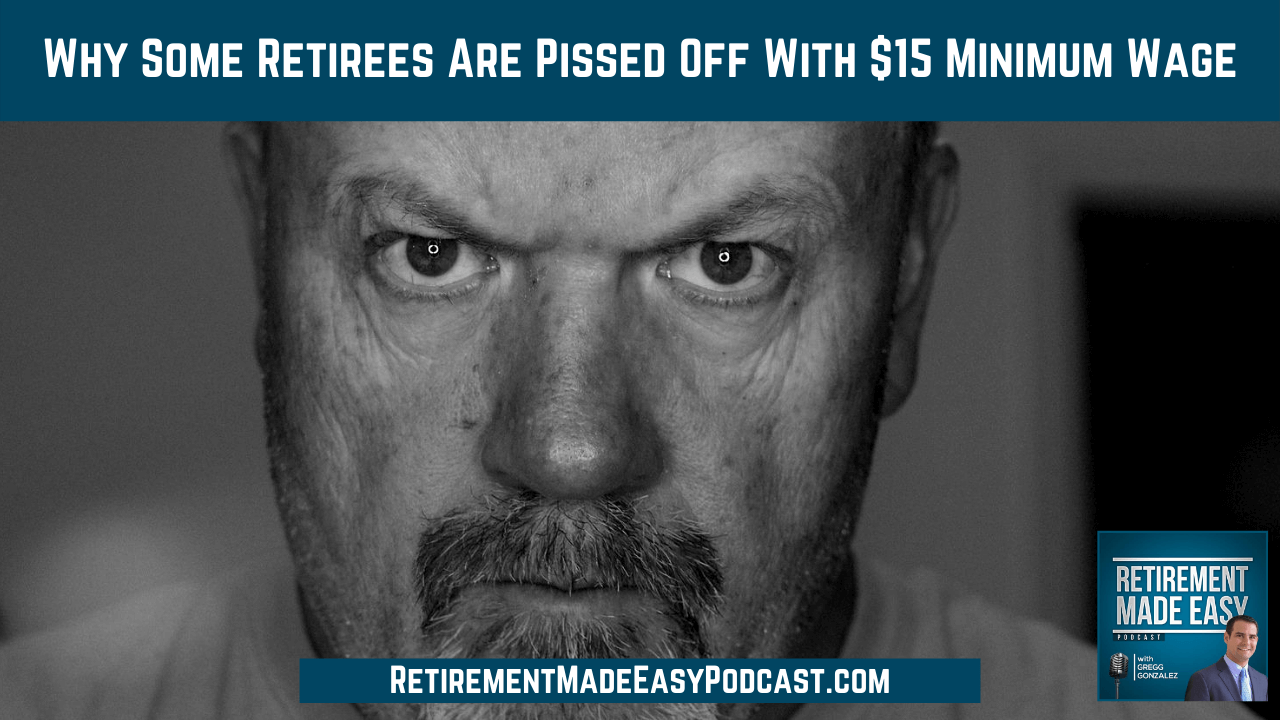
What does a $15 minimum wage have to do with retirees? Why would they be upset about it? Is it that big of an issue? Illinois recently enacted a plan to increase their minimum wage by $1 each year until 2025—at which time they’ll have fully implemented a $15 minimum wage. In this episode of Retirement Made Easy, I use some hypothetical scenarios to explain the impact of the minimum wage increase and what pre-retirees need to prepare for.
You will want to hear this episode if you are interested in…
- [1:24] Why are retirees pissed off about the $15 minimum wage?
- [2:26] A Hypothetical example of a retiree in Illinois
- [5:14] How the minimum wage increase will impact grocery stores
- [7:63] WHY the minimum wage increase is terrible news for retirees
- [9:59] Check to see what your local state has in place for minimum wage increases
- [14:11] Understand the retirees perspective and how it impacts retirement planning
- [14:45] A brief discussion on the impact to small business owners
- [15:34] How to plan and prepare for a successful retirement
The lifestyle of a hypothetical retiree
In my hypothetical, an Illinois native has been retired for a few years now. This person has a fixed monthly pension of $2,000 a month. The pension doesn’t have a yearly cost of living adjustment. It will be the same from the beginning of their retirement to the end. This retiree also receives a social security income. Social security DOES have a cost of living adjustment—but it’s not adjusted every year.
The average cost adjustment to social security over the last 10 years is an increase of 1.52% annually. The last assumption about our hypothetical retiree is that they withdraw money from retirement savings monthly to supplement their pension and social security. So how does a $15 minimum wage impact them?
Business owners will pass their costs to consumers
Let’s say you own a grocery store and our hypothetical retiree shops there every week. You now have to pay your employees a minimum wage of $10 an hour. And every year, the minimum wage will increase $1 until it hits $15 in 2025. This means your payroll costs will go up 50% in 5 years. This leads you to contemplate your options:
- Option #1: You raise prices by 10% every year for the next 5 years to remain profitable.
- Option #2: You hire 10% fewer people to control payroll costs.
- Option #3: You pay to install self-checkouts instead of paying cashiers an hourly minimum wage. Every grocery store in town will likely do this. Some forward-thinking grocery stores have inventory robots already in place.
For the grocer, increasing prices is the easiest solution to their problems—but terrible news for your retiree. Every year, the cost of groceries increases but the retirees’ social security barely increases and his pension is fixed. This forces our retiree to withdraw more money from his 401k every single year.
But wait—price increases won’t stop at the grocery store. Need an oil change? Want to take your Grandkids to McDonald’s for a Happy Meal? You want to see the latest movie? Be prepared for those prices to increase exponentially.
How to plan and prepare for a successful retirement
No one told this retiree that the cost of goods would increase so much during their retirement. Any retiree that hears the news of a minimum wage increase will feel their heart sink and think “No one told me.” A decision was made that’s 100% out of their control and it feels like financial suicide. “If I had known this, I may have pushed off my retirement date. I may have saved more for retirement.” The truth is, increasing minimum wage hurts the retiree more than it hurts anyone else.
Every year, a dollar buys less and less. Everywhere we look costs are increasing. Most retirees have a fixed budget. Will they have to cut their living expenses? Will they run out of money? Every single wage increase will be passed on to the consumer and retirees are the ones that are most affected. So what can you do to prepare for the future and lessen the impact of inflation?
Firstly, do NOT ignore the potential of cost-of-living increases in retirement. For pre-retiree listeners, plan on significant rises in cost throughout your entire retirement. Your living costs may double or triple. Do not be surprised by it. You have to be the person prepared for anything—no matter what retirement throws your way. For the full discussion and more tactics to prepare, listen to the whole episode of Retirement Made Easy!
Resources & People Mentioned
Connect With Gregg Gonzalez
- Email at: Gregg@RetireSTL.com
- Podcast: https://RetirementMadeEasyPodcast.com
- Website: https://StLouisFinancialAdvisor.com
- Follow Gregg on LinkedIn
- Follow Gregg on Facebook
- Follow Gregg on YouTube



